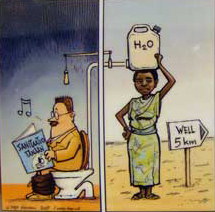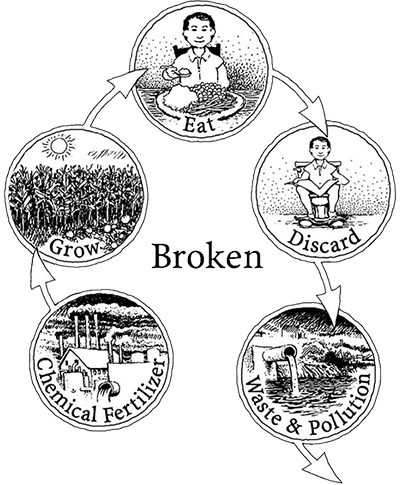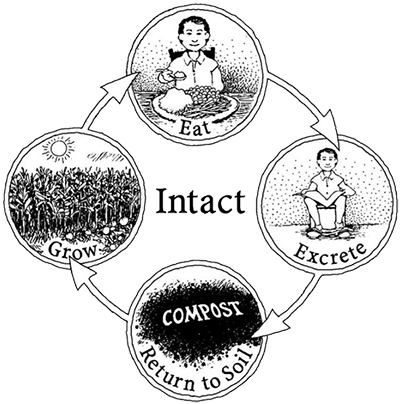THE HUMANURE HANDBOOK
THIRD EDITION
A GUIDE TO COMPOSTING HUMAN MANURE
by Joseph Jenkins
Due to concerns over the effects flooding is having with our local sewage treatment facilities, Logan city sent out a bulletin on Feb 10th to residents of Logan and surrounding cities to “PLEASE AVOID UNNECESSARY DISCHARGE INTO THE SEWAGE SYSTEM… Until further notice, we ask that residents please avoid putting… unnecessary water down drains.” Which they said includes flushing. I couldn’t help but wonder how many of my trips to the toilet could be considered “unnecessary”.
I recently finished reading The Humanure Handbook by Joseph Jenkins. I found the information simply incredible. If you are looking for an alternative to flush toilets that wastes and pollutes our precious water resources, this book is a must read. Even if you don’t care about the environment, who wouldn’t be at least remotely interested in a fully functioning, completely sanitary composting toilet system that takes care of household human waste, uses no water, does not stink, and actually contributes to a healthy environment?
I’m sure it is because I have such an interest in the subject, but the book captured me. Previous to running across this book I had been considering what it takes to get into a commercially available composting toilet. The $900 to $1200 price tag was a big deterrent (and that’s for a cheap one). I now have built a complete functioning composting toilet system of my own, that does not stink, contributes to the environment, and is easy to maintain, all for less than $100. I like it so well that some days I even feel dismayed at the waste when I have to crap in a flush toilet during the day while at work.
To be sure, it’s not the kind of subject you would expect a normal person to get excited blogging about. But then again, I don’t consider myself normal.
The subject is actually not that abnormal as we read from the book’s introduction:
“This is the third edition of a self-published book. No respectable publisher would touch it with a ten foot shovel. Nevertheless, the book has now been sold around the world, translated into over a dozen languages and published in foreign editions on four continents. It has been talked about on NPR, BBC, CBC, Howard Stern, in The Wall Street Journal, Playboy Magazine and many other national and international venues.”
Discussing the growing concerns that well informed health professionals and environmental authorities have over the environmental dilemma of human waste, Jenkins shares that this may be “why I received a letter from the U.S. Department of Health and Human Services praising this book and wanting to know more about humanure composting, or why the U.S. Environmental Protection Agency wrote to me to commend the Humanure Handbook and order copies, or why the Pennsylvania Department of Environmental Protection nominated Humanure for an environmental award in 1998.” (pg 196)
In addition to the practical information given in the book, Jenkins has opened my eyes to problems we face as it relates to the bigger picture. Rather than comment further, I’ll let him speak for himself. Here are a few excerpts from the book that I highlighted:
“The world is divided into two categories of people: those who shit in their drinking water supplies and those who don’t. We in the western world are in the former class. We defecate into water, usually purified drinking water. After polluting the water with our excrements, we flush the polluted water “away,” meaning we probably don’t know where it goes, nor do we care.
Every time we flush a toilet, we launch five or six gallons of polluted water out into the world. That would be like defecating into a five gallon office water jug and then dumping it out before anyone could drink any of it. Then doing the same thing when urinating. Then doing it every day, numerous times. Then multiplying that by about 305 million people in the United States alone.” (pg 15)

“According to a composting toilet manufacturer, waterless composting toilets can reduce household water consumption by 40,000 gallons (151,423 liters) per year. This is significant when one considers that only 3% of the Earth’s water is not salt water, and two thirds of the freshwater is locked up in ice. That means that less than one percent of the Earth’s water is available as drinking water. Why shit in it?” (pg 117)

In his section about wastewater systems, he notes, “My research for this chapter included reviewing hundreds of research papers on alternative wastewater systems. I was amazed at the incredible amount of time and money that has gone into studying how to clean the water we have polluted with human excrement. In all of the research papers, without exception, the idea that we should simply stop defecating in water was never suggested.” (pg 207)

Finally, I liked his ENVIRONMENTAL POTTY TRAINING 101, “Simple, low-tech composting systems not only have a positive impact on the Earth’s ecosystems, but are proven to be sustainable. Westerners may think that any system not requiring technology is too primitive to be worthy of respect. However, when western culture is nothing more than a distant and fading memory in the collective mind of humanity thousands (hundreds?) of years from now, the humans who will have learned how to survive on this planet in the long term will be those who have learned how to live in harmony with it. That will require much more than intelligence or technology — it will require a sensitive understanding of our place as humans in the web of life. That self-realization may be beyond the grasp of our egocentric intellects. Perhaps what is required of us in order to gain such an awareness is a sense of humility, and a renewed respect for that which is simple.” (pg 201)
Contrast this with the cost prohibitive complexities of attempts to use technology to tow an iceburg to be used for drinking water:
For more information, or to buy the book, or to watch informative videos about humanure, visit HumanureHandbook.com.
